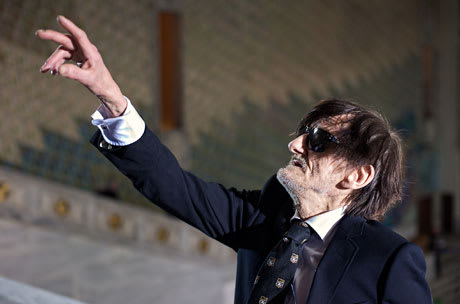Born Terje Brofoss, in 1940, the Norwegian artist self-named Hariton Pushwagner (a pretentious hippie nod to the Hari Krishnas and the bourgeois lifestyle of your average shopping cart pushing consumer denizen) is known mostly for his paintings about the Apocalypse and the "family man." He also wrote a graphic novel in the '70s that was lost in a suitcase, only to turn up three decades later partly published.
His disposition is that of your average, angst-ridden undergraduate, focused on the endless performance of his affected identity as deliberately contrasting with the perceived banality and mundanity of the everyman he paints in office buildings and line-ups, each with the same blank expression. Only he's in his 70s and still desperately clinging to the notion that he's somehow in possession of a greater truth that alludes the rest of us, which is perhaps why he's a desperate alcoholic and drug addict, clinging to the importance of his gallery shows, where he thrives on the attention of those he criticizes.
This experimental documentary of sorts follows him through his daily life for three years, drinking profusely and making glib, obvious statements about civilization without culture being ridiculous. Directors Even Benestad and August B. Hanssen play along with his central conceit, which is that he will choose how he is framed and portrayed, worrying about camera placement and scene composition, mostly to exaggerate his self-delusions about the importance of his art.
Animation is used to transpose his works onto building walls and his visual image, which is contrasted with the black and white footage of him walking around old haunts where he dabbled with homelessness after a failed relationship.
Eventually the documentary settles into an ersatz narrative about a court case between him and Morten Dreyer, where he attempts to reacquire some of his older drawings. But by this time, the persona of a man that has spent his life avoiding maturation makes his success, or potential alcohol-fuelled death, somewhat of a moot point.
We're left mainly with a nagging confusion as to why anyone would care about his trite, Keith Haring-esque drawings or his pathetic attempt to be different in the first place.
(Indie Film)His disposition is that of your average, angst-ridden undergraduate, focused on the endless performance of his affected identity as deliberately contrasting with the perceived banality and mundanity of the everyman he paints in office buildings and line-ups, each with the same blank expression. Only he's in his 70s and still desperately clinging to the notion that he's somehow in possession of a greater truth that alludes the rest of us, which is perhaps why he's a desperate alcoholic and drug addict, clinging to the importance of his gallery shows, where he thrives on the attention of those he criticizes.
This experimental documentary of sorts follows him through his daily life for three years, drinking profusely and making glib, obvious statements about civilization without culture being ridiculous. Directors Even Benestad and August B. Hanssen play along with his central conceit, which is that he will choose how he is framed and portrayed, worrying about camera placement and scene composition, mostly to exaggerate his self-delusions about the importance of his art.
Animation is used to transpose his works onto building walls and his visual image, which is contrasted with the black and white footage of him walking around old haunts where he dabbled with homelessness after a failed relationship.
Eventually the documentary settles into an ersatz narrative about a court case between him and Morten Dreyer, where he attempts to reacquire some of his older drawings. But by this time, the persona of a man that has spent his life avoiding maturation makes his success, or potential alcohol-fuelled death, somewhat of a moot point.
We're left mainly with a nagging confusion as to why anyone would care about his trite, Keith Haring-esque drawings or his pathetic attempt to be different in the first place.




